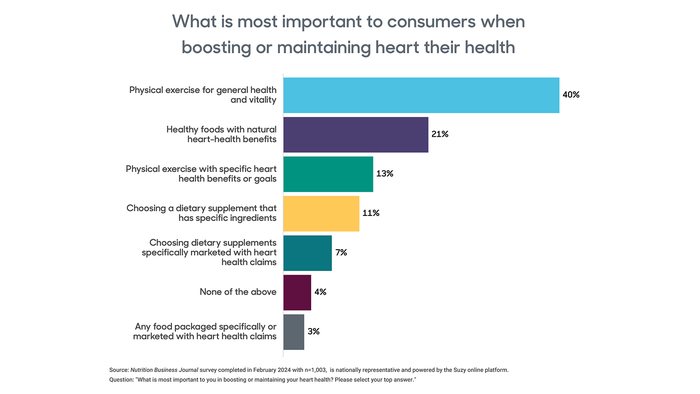Monitor: Consumers care about heart health, show little interest in product claims
Brands and retailers can fill the void with education efforts, links to American Heart Association website. Learn more about recent survey results.

Consumers are concerned about heart health and taking steps to preserve it, but those steps are more broad than focused, suggesting the natural products industry could be offering more targeted education and marketing, according to new research from New Hope Network.
The survey deployed in the opening days of American Heart Month found that 37% of respondents put their level of concern— on a scale of one to five—in the highest bracket when asked, “How conscious or concerned are you about your current or future heart health?” Another 33% of consumers placed themselves in the next highest bracket, meaning 70% of consumers indicated their concern was high. Only 3% characterized themselves as “not at all” concerned.

The high level of concern, however, does not appear to be matched by a high confidence in products or practices specifically targeting heart health.
Asked to name what was most important to boosting or maintaining their heart health, “physical exercise for general health and vitality” was the most-cited response, representing 40% of respondents. Only 13% of respondents chose exercise with specific heart-health benefits or goals.
The survey showed a similar pattern regarding food. “Healthy foods with heart-health benefits” was the choice of 21% of respondents, but only 3% said that packaged foods with heart-health claims were most important. That broad approach was matched again in supplements where 11% chose supplements known for heart health benefits, but only 7% called supplements marketed with heart health claims most important.
The good news from the survey is that people are conscious of heart health and want to do something about it. That such awareness is translating into exercise and healthier eating is encouraging, but the fact that the response is so general might be telling us how simultaneously sophisticated and vague the awareness is.
Consumers may regard heart health messaging as inconsistent and even contradictory. For example, one story might report that eggs are good for you while the next story claims they are bad. Injecting clarity into that conversation is no small challenge for packaged food and supplement brands, but consumers have more access to the most recent findings than ever. Brands could help them find it.
The American Heart Association’s Heart Month content is deep with the latest findings and information on lifestyle change. Brands in supplements and foods could be offering that information through front-of-package QR codes. Quizzes and self-assessments could be part of that content and guide consumers to lifestyle changes that match the product.
The level of concern among consumers is high. It’s up to brands to match that with education.
About the Author(s)
You May Also Like




